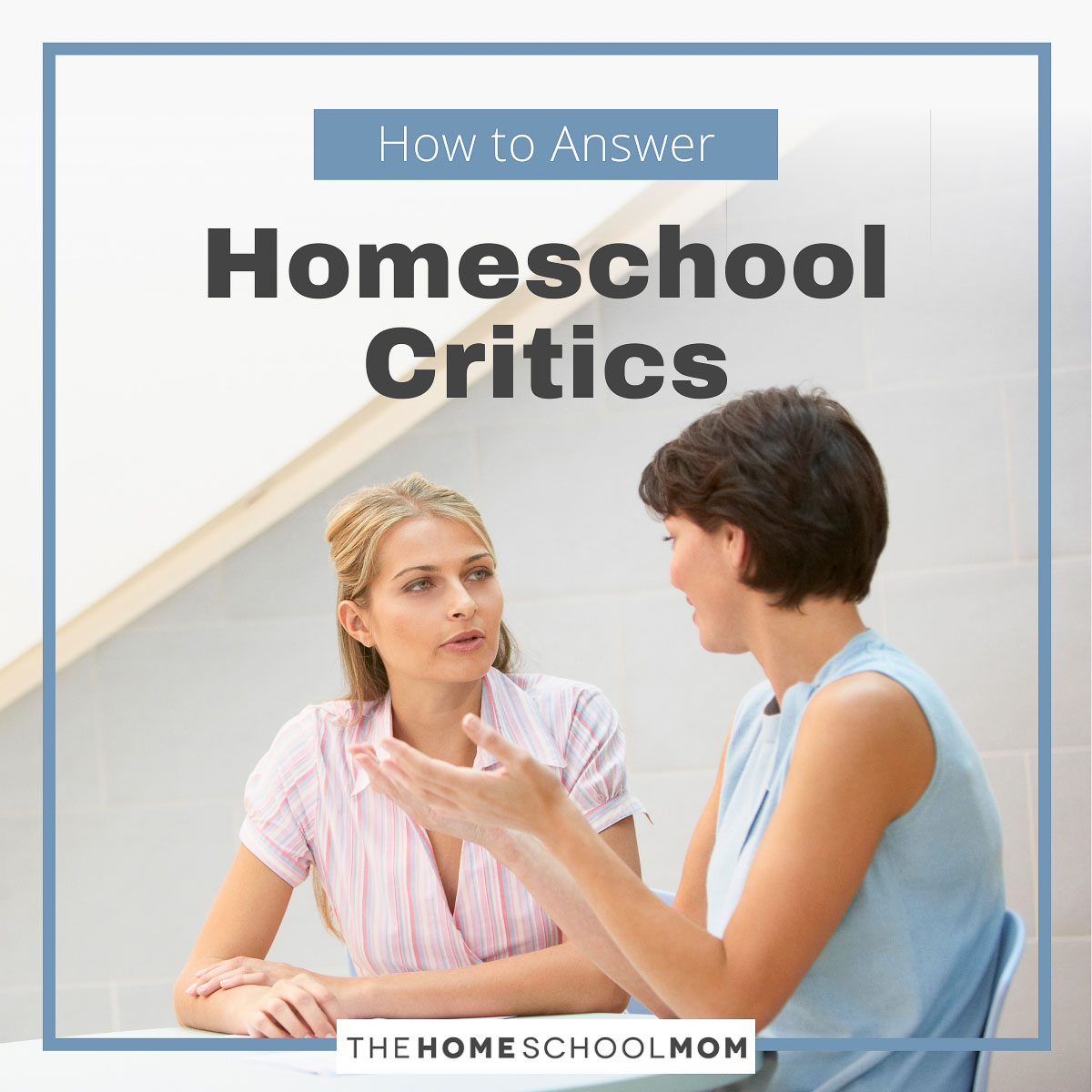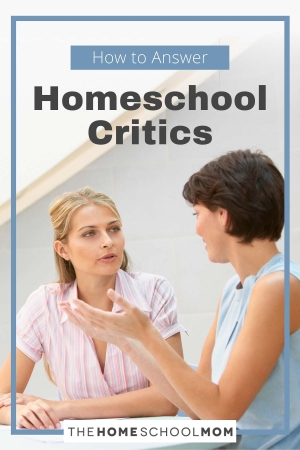Do you feel put on the spot to explain why you are homeschooling your kids?
Do you worry what friends, in-laws, and other relatives think about your decision to homeschool?
During 2020, many parents felt extra-justified and got less criticism for homeschooling because of school closings. You may feel like a target now, with school attendance returning as a default expectation in many communities.

What can you do when people feel comfortable making negative comments about your choice to homeschool? Try one or more of these strategies:
Flip the script
When someone asks you about your homeschooling with the intent to criticize, ask them about their choice to send their kids to public school. Really. They may say, “Aren’t you worried about homeschooling and the kids’ socialization?”
You can respond, “We think this will work great for now. Are you (or weren’t you) concerned about your kids and the social setting at school?”
You don’t have to convince them of your choice; just give them a chance to talk about their choice. This has the added element of leveling the playing field: you are conversationally positioning yourself as having a right to deflect their question and ask your own.
Provide information
If the person who is criticizing the choice is important to you and typically listens to reason on other topics, you might be able to provide information that will help them understand homeschooling. Finding out that homeschooled kids do get into college, for example, may allay the concern of otherwise supportive grandparents.
Don’t exhaust yourself with people who prove themselves unwilling to learn.
Change the subject
Again and again, if necessary. Don’t engage with people on a sensitive topic that is not their business.
“We’re excited about homeschooling this year. I have a lot to do to get ready. What’s your favorite place for school supplies (or way to get quick dinners on the table, or something else)?”
Listen
Reflect that question right back and listen to the response. “You’re wondering if I’m worried my kids will turn out weird if we homeschool.” Then, listen to the anecdote that follows. (“Our neighbor who homeschooled was so quiet/noisy/nosy”).
Listening may help you learn more about the source of the concern, allow you to point out that your situation is different, or give you a chance to note that school kids have their own ways of “turning out weird” sometimes, too.
Sometimes you can laugh it off: “Yeah, I went to school and was quiet/noisy/nosy myself!”
QTIP
Quit Taking It Personally.
Sometimes your choice to homeschool feels aimed at a person who sends (or sent) their own kids to school or who is a school teacher or administrator. Their questions come at you from a place of their defensiveness—public school is good enough for their kids; why isn’t public school good enough for yours?
Can you internally reframe their question as being about them instead of being about your choice? Think to yourself, “Oh, they’re feeling defensive. This sets them off balance because it’s not their choice.”
This may help you feel less attacked and less in need of defending yourself. Then you can employ one of the above strategies without feeling it is up to you to justify yourself to someone who is not your kids’ parent.
Realize that it doesn't matter
It almost never matters what others think about your choice to homeschool, and if it does matter, homeschooling may not be at the heart of a more serious relationship challenge or your own need to grow in owning your decisions, setting boundaries, and the like.
Homeschooling, which is parenting on steroids, certainly provides a lot of opportunity for that growth, doesn’t it?
Those of us who homeschooled during school closings got a bit of a pass from our critics, but many of them will be back in full force during the coming years. Give some thought to some strategies that can disarm your critics, so you won’t feel so put on the spot when they say something negative.
Just because you know homeschooling is right for your family doesn’t mean you have to take critics of homeschooling to heart or convince the world to homeschool—although some parents do choose to work or volunteer as homeschool advocates.
But you can homeschool from a place of power, confident in your own choice, and rising above your critics.




 A popular speaker at homeschooling conferences, business groups, and parents’ groups, Jeanne Potts Faulconer homeschooled her three sons in North Carolina, Mississippi, and Virginia for twenty years. Holding her Master of Arts degree in Communication, Jeanne conducted portfolio evaluations for Virginia homeschoolers for evidence of progress for many years. Jeanne is a former college faculty member, former editor for several publications, news correspondent for WCVE, and former director of Brave Learner Home. She is the contributing editor for TheHomeSchoolMom newsletter and writes the popular Ask Jeanne column addressing homeschool parents' questions here at TheHomeSchoolMom.
A popular speaker at homeschooling conferences, business groups, and parents’ groups, Jeanne Potts Faulconer homeschooled her three sons in North Carolina, Mississippi, and Virginia for twenty years. Holding her Master of Arts degree in Communication, Jeanne conducted portfolio evaluations for Virginia homeschoolers for evidence of progress for many years. Jeanne is a former college faculty member, former editor for several publications, news correspondent for WCVE, and former director of Brave Learner Home. She is the contributing editor for TheHomeSchoolMom newsletter and writes the popular Ask Jeanne column addressing homeschool parents' questions here at TheHomeSchoolMom.
Leave a Reply